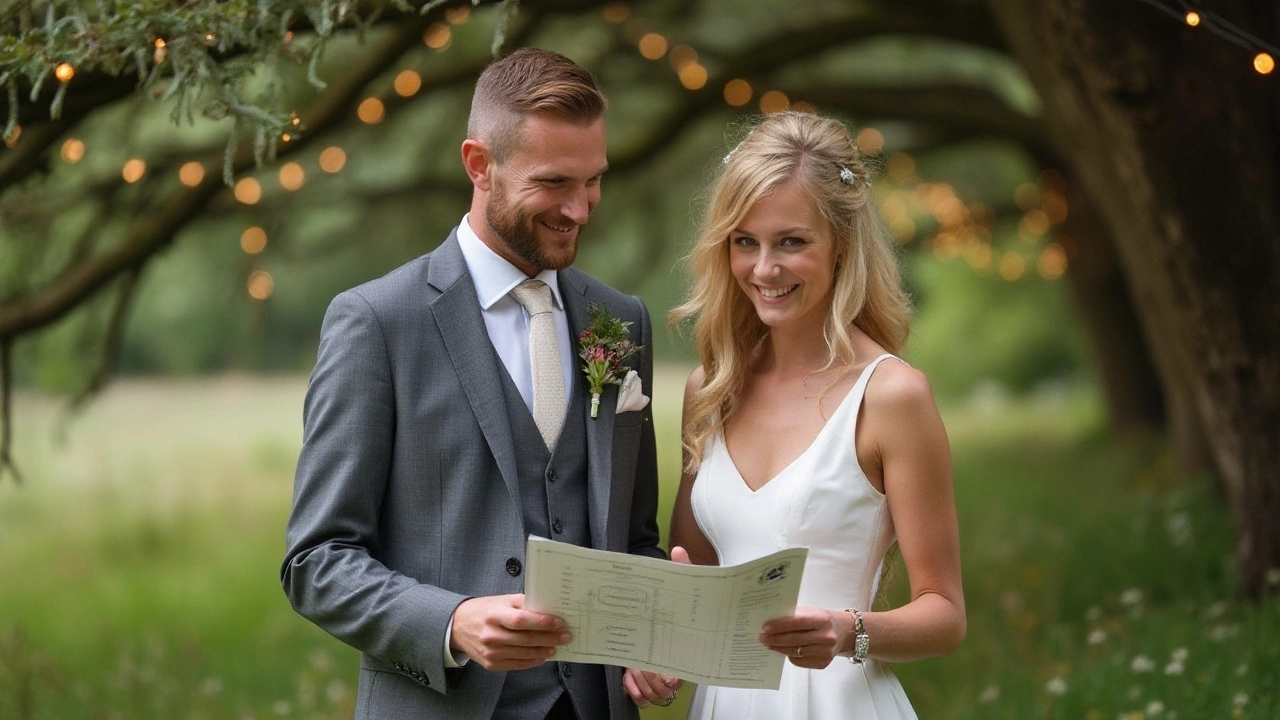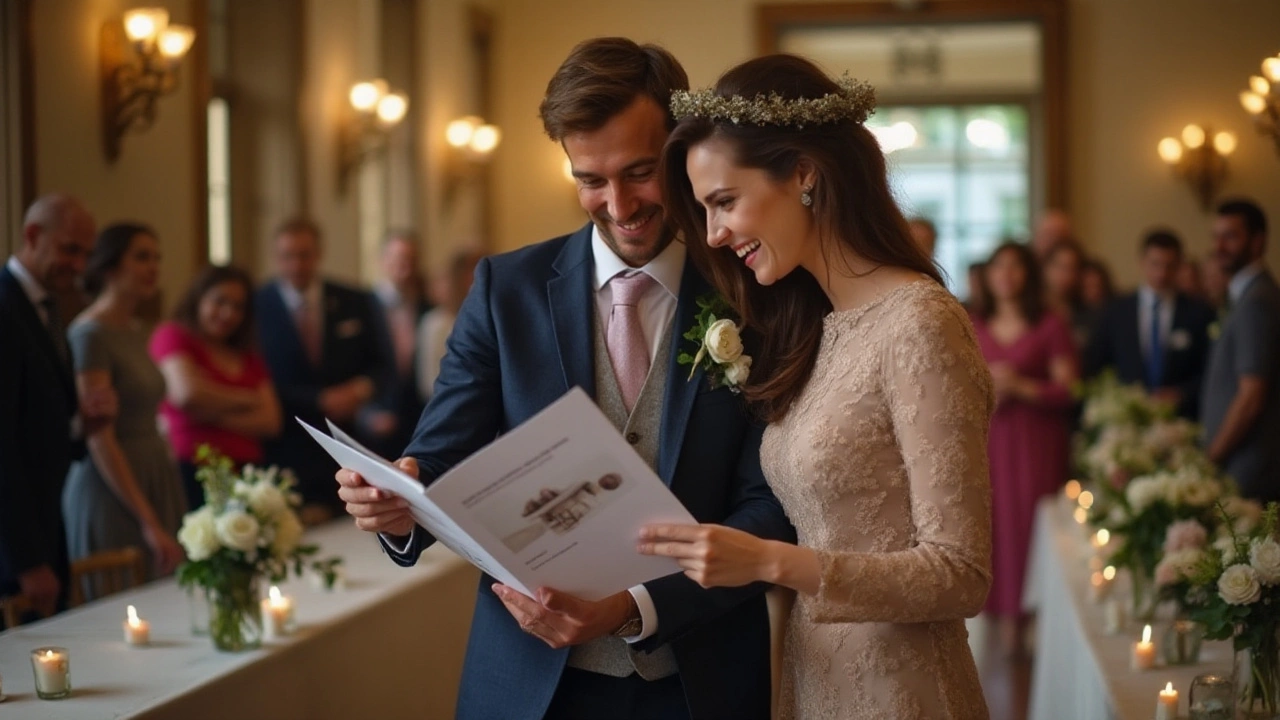Crafting a Sensible Wedding Budget: Navigating Venue Costs
 Jan, 4 2025
Jan, 4 2025
It’s no surprise that one of the first questions on a couple's mind is how to craft a budget for their dream wedding, especially when it comes to the venue. The venue often takes a large slice of the pie, making it essential for couples to plan carefully before the excitement carries them away.
With a splash of creativity and a good grasp of your priorities, your budget won’t just be numbers on a spreadsheet—it's your ticket to a beautiful day. Many couples find value in consulting with wedding planners or talking to newlyweds about their experiences, as these personal insights can provide unexpected perspectives.
- Understanding Venue Costs
- Setting Your Budget: What to Consider
- Creative Ways to Save
- Market Trends and Rates
- Prioritizing Your Wedding Day Expenses
Understanding Venue Costs
When planning a wedding, understanding how venue costs can impact your budget is crucial. The truth is, selecting a venue isn't as simple as pointing to a picturesque spot on a map and calling it a day. There are layers of expenses tied to booking a venue that often catch couples by surprise. What you pay isn’t just for the physical space you adore—in fact, it's much more.
Venue costs can encompass a broad spectrum. It’s about the location, the season, demand, and what’s included in the package. For instance, many traditional venues offer bundled services—catering, staffing, and décor—which can be a blessing or a curse depending on your plan. Some spots might charge a flat rate, but others have a per-guest fee, making your choice of an intimate wedding or a grand celebration all the more impactful.
Transportation and logistics should also factor into your venue budget. A dream venue that’s off the beaten track will rack up costs in guest transportation and possibly even accommodations. Not to mention, venues in urban areas might include costs associated with parking or traffic management. A 2023 survey showed that couples typically spent anywhere from 30% to 50% of their total wedding budget just on the venue alone, a figure that can quickly balloon if extras aren't accounted for.
Another unexpected consideration? The hidden costs, like service charges, taxes, and gratuities, can add up quickly. These figures can range from a modest percentage to nearly a fourth of your bill. Ensure you read the fine print of each contract carefully, perhaps even seeking the counsel of friends who've gone through the process or a professional planner who can offer guidance. As renowned planner Colin Cowie mentions,
"A great wedding should be a reflection of the couple’s love story, not their financial stress."
Lastly, some venues have those extra sweeteners: bespoke lighting, customizable layouts, or exclusive partnerships with vendors that might come bundled with the space. Choosing a venue with surefire inclusions can really put your mind at ease while trimming down your vendor list. Let’s not forget, though, every additional luxury comes with its own price tag. Keep a keen eye on these extras, and always negotiate where you can—venues often have wiggle room.
Setting Your Budget: What to Consider
Creating a wise and thoughtful budget for your wedding is an essential step that can determine how your day unfolds. As you begin, consider your total wedding budget and how much you want to allocate specifically to the venue. This decision will be crucial in shaping the rest of your planning process. Many find that it helps to start by identifying the type of venue that speaks to your heart—be it a sprawling vineyard, a cozy barn, or an urban loft. Make sure you factor in the hidden costs, such as service charges, taxes, and additional rentals, which can considerably add to the base price. Remember, the venue often sets the stage, and its style may influence other décor and entertainment decisions.
Don't forget to account for the guest experience when setting the venue budget. The number of guests can dramatically increase expenses, from catering to seating. Thus, keeping your guest list reasonable might help relieve pressure on venue spending. For example, if you're paying per head, a significant reduction in attendees could result in substantial savings, allowing you to splurge more on an enchanting venue. Speaking of enchantment, remember that location plays a pivotal role. An accessible and stunning location often boosts the value for your guests, making them feel part of an extraordinary celebration that they'll cherish.
A tip from many seasoned wedding planners: allocate a contingency fund within your budget. Surprises will inevitably pop up, and it's best to be prepared. Planners often suggest setting aside approximately 5-10% of your total budget for unanticipated expenses. This can keep stress levels low as the big day approaches. Simplicity is often key; sometimes, scaling back allows you to invest more in quality over quantity, ensuring everyone has a delightful day. As Mark Ingram, an expert in bridal fashion and events, eloquently puts it,
"Budget is not just about cutting costs—it's actually about creating a day that you'll fondly remember without wondering why the expense tallies kept increasing."
The Balance Between Dream and Reality
Striking a balance between your dream day and budgetary reality requires a little ingenuity and flexibility. Consider the day of the week and the season when booking. Many couples find that marrying on a weekday or during less popular wedding months, such as January or February, can result in significant savings. This can be especially helpful if you have a specific venue in mind that might be more affordable at these times. Creative scouting of venues that double up as cost-effective options can also help; parks, libraries, and art galleries might surprise you with their offerings, without the high price tag of traditional wedding venues.
Lastly, communication is key. Keeping the dialogue open with family members or friends who may be contributing financially can help allocate resources efficiently. Transparency about your venue budget is crucial when negotiating with vendors, as they might offer package deals or discounts if there’s clarity from the start. Keep in mind, your chosen venue is not only a backdrop but a reflection of you as a couple, weaving memories that will last far beyond just one day. And every careful line item in the budget is simply a part of crafting this enchanting chapter of your journey together.

Creative Ways to Save
Planning a wedding on a budget doesn't mean sacrificing elegance or charm. Most of us cherish the idea of a picture-perfect day, but when the reality of *venue costs* sets in, it's time to get a little creative. Couples across the globe have turned to ingenious methods to cut corners financially while still hosting an unforgettable event. One of the simplest tricks is to consider an off-peak wedding date. Traditionally, spring and summer weekends command higher prices, but opting for a weekday or embracing the cooler months can slash thousands off your venue costs. Venues often extend discounts simply because demand is lower, and while the setting may be glistening with a sprinkle of fantasy, the satisfaction of a smart deal can brighten even the cloudiest day.
Another worthwhile strategy is to explore unconventional venues. Ask yourself: Does it have to be a ballroom? Industrial spaces, art galleries, and even a parent’s backyard can provide the perfect canvas for a bespoke celebration. Such locations may offer not only financial savings but a unique vibe that’s truly your own. Tap into your network, and you'll be surprised at the gems that might be available just within arm’s reach. Now, consider trimming down the guest list. While every couple dreams of sharing their joy with everyone they know, caterers and venues charge per head, and sparing those invitees attending out of social obligation can significantly ease the budget.
There's also value in considering a botanical garden or a local park. Nature often outdoes the finest decorators, offering an ambiance already filled with unmatched beauty. Renting a public space might involve a permit, but the cost is typically less than traditional venues, and the combination of blooming flora and personal touches can transform the ordinary into something truly magical. To incorporate even more savings, couples can approach students or upcoming talents for services like photography or live music. Aspiring professionals often bring along enthusiasm and creativity, eager to build their portfolio, and they tend to charge a fraction of what established experts do.
"We chose a vineyard during their off-season, and not only was it breathtaking, but we also saved over 40% on our venue budget," shares Emily Russo, a recent bride who creatively allocated her wedding funds. Every little saving accumulates, and before you know it, you've made significant headway without even a hint of compromise on flair.
Last but not least, it's worth thinking small to go big with your budget. Intimate weddings, with their cozy gatherings, encourage deeper connections. When you reduce the scale, more attention can be placed on details that truly matter without amplifying the expense. Whether it’s focusing on floral arrangements or the *wedding planning*, money saved from scaling down could mean a memorable honeymoon instead.
Market Trends and Rates
As we step into 2025, trends in wedding venues have been evolving with a flair that mixes traditional elegance with modern creativity. Understanding these trends not only helps in predicting costs but also aids in making informed decisions that align with your budget. Many couples today choose to celebrate in versatile spaces that offer flexibility and add a touch of unique charm to their weddings. The rise in demand for venues such as barns, rustic warehouses, and botanical gardens is a telling sign of the desire for spaces that provide both beauty and adaptability. While these options often present cost-effective solutions, the price tag can vary significantly depending on location, size, and amenities offered.
In metropolitan areas, the cost of wedding venues can be particularly steep. Many urban venues come with high price points due to the demand and the premium associated with city locations. On average, venues in bustling cities range from $10,000 to $20,000, with luxury sites potentially doubling that estimate. This is where a little creativity can go a long way; some couples opt for a weekday wedding to slash the costs dramatically. A Monday or Thursday wedding can save you up to 20-30% on the venue price, offering the same experience without the inflated weekend rates.
Recent data from a trusted bridal magazine highlighted that 40% of a couple's budget typically goes towards the venue. This underscores the importance of researching market rates to ensure your dream venue fits within your financial plans. A comparative analysis could reveal unexpected savings. Another smart approach is seeking out venues that include everything from catering to decorations. Bundling these services not only simplifies the planning process but can also lead to substantial discounts, allowing you to stretch your budget further.
Cherise Baldree, an industry expert from 'The Wedding Style Network,' notes, "Couples are now more adventurous with their choices, seeking venues that can serve as a canvas for their personality and style. Understanding that the cost is much more about what a location offers beyond the obvious factors like geography and size is key."
This sentiment is reflected in many new offerings, like space-sharing models where couples can rent a beautiful home or an art gallery for a fraction of the traditional venue cost. These non-traditional venues often have flexible policies, allowing you to bring in your own vendors, which can lead to additional savings. Keep in mind, though, the necessity of insurance when opting for such unique spots, assuring that unexpected incidents don’t lead to budgetary disasters.
Current Venue Rates by Region
| Region | Average Cost |
|---|---|
| Urban East Coast | $15,000 - $30,000 |
| Rural Midwest | $5,000 - $12,000 |
| West Coast Outdoor Venues | $10,000 - $25,000 |
Being savvy about market trends and rates allows you to navigate the complex world of wedding venue costs with clarity and confidence. Allocate time to visit potential venues, and don't hesitate to ask for detailed pricing lists that highlight what's included. Remember, the perfect venue is more than just a picturesque backdrop—it’s the stage for your memories. Equip yourself with knowledge and creativity, and you will find the one that’s right for you, both in spirit and in budget.

Prioritizing Your Wedding Day Expenses
When it comes to planning a wedding, figuring out which expenses to prioritize can make the entire process smoother and less stressful. Knowing where to allocate finances and when to tap into creativity can save you a lot of anxiety down the road. Start by honing in on what truly matters to you and your partner. Is it the venue, the guest list, the floral arrangements, or perhaps the attire? Having this conversation early on can set a strong foundation for your budget.
Identifying Core Priorities
Most couples find that once they've pinpointed their top priorities, managing expenses becomes less daunting. By dedicating a specific percentage of your wedding budget to these must-have elements, you're effectively safeguarding them from potential cuts if unexpected costs arise elsewhere. For example, many couples choose to splurge on a meaningful location, perhaps one that holds cherished memories or offers a breathtaking view for the day's events.Moreover, planning with a focus on the bigger picture can help set reasonable expectations. Many times, it's the little things that we overlook which can add up significantly. From personalized favors to elaborate welcome bags for guests, these extras can pinch the pocket without adding substantial value to the overall experience. Hence, updating your list of non-negotiables regularly ensures you're putting your resources where your heart is most invested.
Balancing Quality and Quantity
The next step to prioritizing expenses is finding a balance between quality and quantity. Whether it’s the caterer who makes every meal unforgettable, or a DJ who ensures the dance floor stays alive, deciding where quality cannot be compromised is crucial. Yet, there's always place for compromise elsewhere. According to a survey by The Knot, the average wedding involves around 136 guests, yet scaling the ceremony to just your closest friends and family can yield significant savings. "We've found that focusing on the intimate aspects of a wedding day, rather than over-the-top extravagance, not only saves money, but also creates a more meaningful experience," said wedding planner and expert Lara Tessaro in an interview with Bride Magazine.
"It's the attention to detail that matters, not necessarily the price tag," Tessaro emphasized.
Don't forget that the market is vast, offering a range of options in every price bracket. Consider hosting the event in non-traditional venues like art galleries or public parks, which often come with a smaller bill compared to regular venues. Also, deciding a wedding date in the off-season months can wield a considerable discount. Utilizing this kind of strategic thinking can preserve your preferred quality while affording a few more delicious splurges!